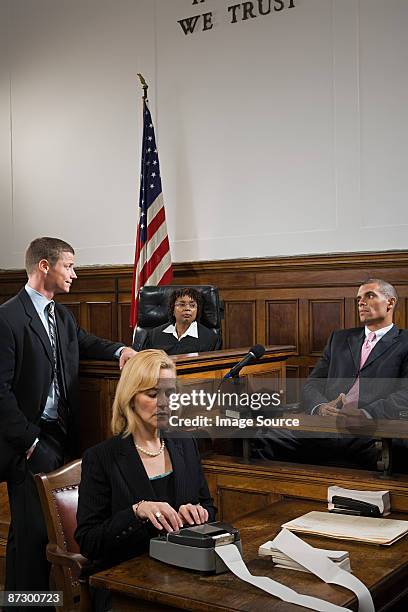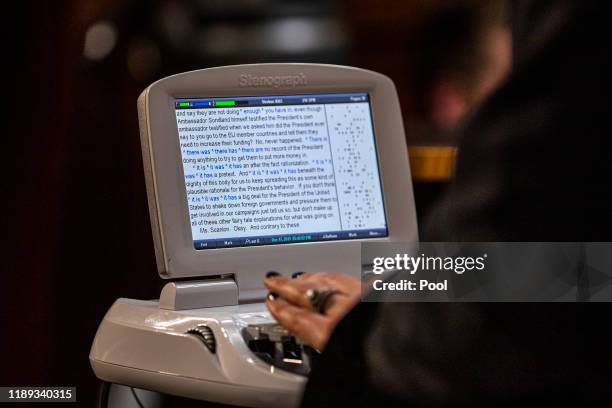What Law Students Should Know About the Court Typist Career
Wiki Article
Comprehending the Duty of a Court Typist: Trick Duties and Occupation Path Insights
As a court typist, you play a vital duty in the judicial system, ensuring that every word talked in court is accurately recorded. Your duties go beyond just keying; they entail managing delicate papers and maintaining strict discretion. Comprehending your duties is essential to guiding with this career effectively. But what credentials and skills do you truly require to excel, and what occupation paths can you pursue? Let's check out.Introduction of the Court Typist Role
A court typist plays a necessary duty in the lawful system, ensuring that all spoken procedures are precisely recorded. You're the one that captures the nuances of court room dialogue, translating verbal exchanges into composed documents - court typist. This isn't nearly typing; it's about realizing the intricacies of lawful language and procedures. You usually function under pressure, requiring to maintain emphasis while deadlines loom.Your focus to information is paramount, as also the tiniest mistake can have substantial ramifications. You must likewise be familiar with the innovation used in courtrooms, from dictation equipment to transcription software.Moreover, you belong to a larger group, teaming up closely with courts, lawyers, and other court authorities. Your work adds to the transparency and honesty of the judicial procedure. Recognizing your role helps you appreciate the impact you have on guaranteeing justice is served through exact documentsSecret Duties of a Court Typist
While you might assume the role of a court typist is only about inputting, it incorporates an array of vital responsibilities that assure the lawful process runs efficiently. You'll be accountable for recording depositions, hearings, and trials properly, making sure every information is recorded. You'll also examine and proofread documents for mistakes, keeping a high level of precision and clarity.In addition to transcription, you'll organize and submit lawful documents, making them quickly accessible for courts and lawyers. You could require to aid in preparing instance files and updating records as needed. Efficient interaction is crucial, as you'll usually team up with lawful workers to make clear information or collect needed details.Your function also consists of handling due dates, so timely completion of documents is vital. By meeting these obligations, you play a key component in making certain and sustaining the judicial system that legal proceedings are recorded appropriately.Essential Skills for Court Typists
Effective court typists possess a distinct collection of skills that boost their capacity to do properly in a hectic legal atmosphere. First and primary, solid typing skills are important; you'll need to kind swiftly and accurately to stay up to date with court procedures. Interest to detail is vital, as even minor errors can have substantial consequences.You needs to also have a strong understanding of lawful terms, which permits you to properly keep and record papers quality. Superb business skills are essential for managing numerous cases and ensuring target dates are met.Moreover, excellent interaction skills help you interact properly with courts, lawyers, and various other court personnel. Ultimately, flexibility is key; you'll commonly run into unexpected circumstances that call for fast reasoning and problem-solving. By honing these essential abilities, you'll position on your own for success as a court typist in the legal area.Educational Qualifications and Training

To become an effective court typist, you'll require a strong instructional background, frequently including a senior high school diploma or matching. Pertinent typing qualifications can boost your qualifications and improve your work potential customers. In addition, on-the-job training chances can help you acquire the practical skills essential for this duty.
Crucial Educational Background

Appropriate Keying In Qualifications
While having a strong instructional structure is essential, getting appropriate keying qualifications can considerably enhance your credentials as a court typist. Accreditations like the Qualified Professional Secretary (CPS) or the Registered Professional Assistant (RPS) show your efficiency and dedication to the occupation. These credentials not only validate your keying speed and accuracy but additionally display your understanding of legal terms and file format vital in court settings. Furthermore, pursuing specialized training courses in legal transcription can further refine your skills, making you a much more affordable prospect. By purchasing these accreditations, you show prospective employers your commitment to quality and your preparedness to manage the needs of a court typist duty properly. This aggressive strategy can greatly enhance your career prospects.On-the-Job Training Opportunities
As you begin your trip to come to be a court typist, on-the-job training offers vital experience that matches your formal education. You'll likely start in a supportive role, tailing seasoned typists and discovering the ropes of court procedures, terms, and software. This hands-on experience assists you develop vital abilities, such as accurate transcription and time management.Many courts provide structured training programs that permit you to exercise under real conditions, improving your self-confidence and efficiency. You'll additionally get aware of different legal files and court methods, providing you a benefit in your job. Embrace redirected here these chances, as they'll not just refine your typing skills but likewise build your expert network within the legal neighborhood, setting you up for future success.Profession Path and Advancement Opportunities
Court typists commonly locate themselves on an encouraging job course with different development opportunities. As you obtain experience and boost your abilities, you may relocate into functions like lead typist or manager, looking after a team of typists. With additional training, you might focus on legal transcription or court reporting, which normally uses use this link greater wages and greater responsibilities.You might likewise think about pursuing accreditations that can set you in addition to the competitors. Networking with attorneys can open doors to advanced placements, such as administrative duties in law practice or court staff positions.As you remain to build your expertise in legal terms and technology, possibilities in relevant fields like paralegal job or legal support may likewise arise. By being proactive and seeking added training, you can substantially broaden your occupation options and potentially move right into higher-level lawful roles.The Relevance of Precision in Legal Transcription
Accuracy in legal transcription is necessary since even a small blunder can modify the significance of a document. When you're recording, your precision straight affects court proceedings and can affect the end results of instances. By utilizing the right tools, you can improve your accuracy and assurance that every information is caught appropriately.Accuracy in Legal Files
When you think of the legal system, the accuracy of files often makes the difference in between a case won or lost. As a court typist, you are accountable for recording legal procedures with outright precision. Every word, punctuation mark, and format information issues. A solitary mistake can result in misconceptions, misconceptions, or also jeopardize a client's situation. You should remain concentrated, pay attention diligently, and have a complete understanding of legal terms. Additionally, maintaining privacy is vital, as you deal with delicate information. Your role isn't nearly typing; it's concerning ensuring the integrity of legal documents. By honing your skills and focusing on precision, you add significantly to the effectiveness of the lawful system and the quest of justice.Influence On Court Procedures
The success of court procedures depends upon the accuracy of lawful transcription. When you transcribe court hearings, every word matters. A single mistake can result in misunderstandings, influencing the outcome of cases. If you misinterpret a crucial declaration or misspell a vital term, it can change the entire context of the discussion. Juries, attorneys, and juries count on your job to make informed choices based upon the evidence offered. Your interest go to information warranties that the authorities record reflects truth process, supplying quality and accountability. By maintaining high criteria in your transcription, you add greatly to the honesty of the lawful process. Eventually, your role is vital in maintaining justice and guaranteeing that every voice is accurately stood for in courtDevices for Accurate Transcription
To nail exact transcription in the courtroom, you need the right tools at your fingertips. A top quality transcription software program can considerably boost your effectiveness, allowing you to capture every word exactly. Purchase a dependable headset to strain history sound and guarantee quality in audio recordings. A foot pedal can also quicken your workflow, letting you manage playback hands-free. Additionally, maintaining a comprehensive legal dictionary or glossary helps you quickly reference terminology, making sure you don't miss out on crucial details. It's essential to have a comfortable, ergonomic workstation to minimize interruptions and fatigue throughout lengthy sessions. By outfitting on your own with these essential tools, you'll increase your accuracy and add efficiently to the lawful procedure.Job Setting and Task Expectation for Court Typists
Court typists prosper in vibrant atmospheres, commonly located within bustling court houses or legal workplaces. You'll discover yourself bordered by attorneys, from attorneys to judges, all functioning together to assure justice is offered (court typist). Your work area might be fast-paced, needing you to adjust rapidly to varying demands, whether it's transcribing court proceedings or preparing lawful documents.As for the work expectation, the demand for court typists continues to be stable because of the recurring demand for specific documents in lawful settings. While innovation has automated some transcription jobs, proficient court typists that can take care of complicated lawful terms and keep accuracy are still very valued. Several typists also have opportunities for improvement within the legal area, evolving right into functions such as lawful secretaries or management assistants. Your focus to detail and capacity to function under stress will be essential for your success in this substantial functionRegularly Asked Questions
What Tools or Software Program Do Court Typists Typically Use?
Court typists typically utilize transcription software application, word processing program like Microsoft Word, and specialized court reporting devices. You'll also rely on foot pedals and high-quality headsets to enhance precision and effectiveness in your transcription tasks.Just How Does One Discover Task Openings for Court Typists?
To locate job openings for court typists, inspect online task boards, lawful internet sites, and court system occupation web pages. Networking with specialists in the field can also result in unadvertised opportunities you may not find otherwise.
What Is the Ordinary Salary for a Court Typist?
The ordinary wage for a court typist differs by place and experience, yet you can expect it to vary from $35,000 to $55,000 each year. Research neighborhood task listings to obtain a far better feeling of incomes.Exist Certifications Available for Court Typists?
Yes, there are accreditations available for court typists. You can pursue specialist programs that boost your skills, like legal transcription or court reporting certifications, which can boost your career opportunities and reputation in the area.Can Court Typists Job From Another Location or Freelance?
Yes, court typists can work from another location or freelance, especially with innovations in modern technology. You'll find chances in transcription solutions or legal companies that enable flexible job setups, adjusting to your schedule and preferences. As a court typist, you play an important role in the judicial system, making certain that every word spoken in court is accurately captured. Networking with lawful specialists can open up doors to more sophisticated settings, such as management functions in regulation companies or court clerk positions.As you proceed to build your knowledge in lawful terminology and modern technology, chances in relevant areas like legal assistant work or legal assistance may likewise emerge. Your work space might be hectic, requiring you to adapt quickly to differing needs, whether it's transcribing court process or preparing lawful documents.As for the job overview, the need for court typists stays stable due to the recurring requirement for precise documentation in lawful setups. Court typists typically utilize transcription software program, word cpus like Microsoft Word, and specialized court coverage tools. To find job openings for court typists, check on-line job boards, lawful websites, and court system career web pages.Report this wiki page